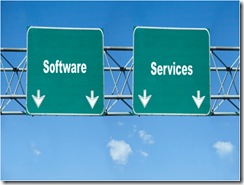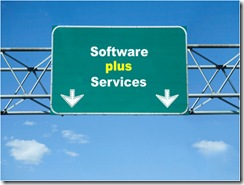Explaining Software plus Services
Sometimes we overcomplicate things here at Microsoft to the detriment of getting a clear message across not only to our customers and partners but also our staff. I had the opportunity to explain Software plus Services recently to many of my UK colleagues and in the interests of both time and clarity I tried to keep it pretty simple. The two images above seemed to help. Here’s sort of what I said
The industry is undergoing a shift that is driven by increased connectivity and increased connected devices of all types. This connectivity, our many devices and our desire to be connected means that Internet services are a great way to free people from being tethered to the information that resides on a single device (e.g. PC at home when you’re on the road) or on place (e.g. CRM systems behind the firewall in your office).
I mention CRM because one of the trends that has exploded in this era is SaaS. I have nothing against SaaS – it’s a perfectly good way to deliver services to a device irrespective of location and often through a browser. It provides tremendous reach and Salesforce.com is a fine example of delivering CRM as SaaS. Similarly Outlook Web Access is a great SaaS solution for getting your email, as is GMail through a browser. SaaS is good. SaaS works – when you have a connection of course and despite all of that ubiquitous connectivity we’re not always connected. I’m typing this on a plane over the Atlantic and whilst there is no on-board wifi (thankfully!) hence in a SaaS world I don’t have my data.
I’m sat on this plane to a guy using an iPod. Is he connecting to iTunes to stream his music direct to his device? No, he has no connectivity hence has downloaded it from that services (or ripped from CD) so he can use it “offline”. When he lands and connects back up to iTunes it’ll help him store his play data out on the Internet or connect and get some new music. That is Software plus Services in action. So is Salesforce.com Offline Edition and Google Gears
It’s taking the best of services and combining with the best of local software to deliver the experience the user wants – the power of choice. At some point in the future we may consume all of our software across the Internet but I’m willing to bet against it – there is much to be gained from using the best of both worlds. Services than run in the “cloud” of the Internet and software than runs locally on a phone, games box, PC, Mac, iPod, television or all manner of other devices.
That’s it in a nutshell. Software plus Services is a Microsoft term that explains an industry trend and whilst I don’t expect others, not least our competitors, to use that term they’re doing Software plus Services. The reach of Internet services combined with the power of local software. It’s as simple as that.
Bonus Link: I just noticed a link to Amit Mital’s talk at Tech Ed Australia where he covers S+S and many of the themes above. Hat tip to Angus.
Comments
Anonymous
September 21, 2008
Steve - nice explanation. But, as you've demonstrated, it's not that we sometimes over-complicate things here at Microsoft; we under-simplify.Anonymous
September 21, 2008
The comment has been removedAnonymous
September 22, 2008
I think you're missing the point of SaaS. I think it's renting software vs. buying a perpetual license and paying annual maintenance. Owning a software license is completely overrated! I want to pay for software like i pay for services (i.e. power). I don't want to own it. The internet has enabled this, but fundamentally it's not what the movement is all about.Anonymous
September 22, 2008
Travis I'm not dismissing SaaS as a purchasing approach at all. It makes a great deal of sense for those companies who don't want to run their own IT, prefer a utility based approach to IT and want to shift CAPEX to OPEX. We're offering SaaS solutions now through partners who offer hosted Exchange and our own Microsoft Online offer so I'm definitely not dismissing it. What I'm suggesting here is that SaaS as the only choice of delivery mechanism runs in to issues when you want to use where you don't have connectivity or you want to use the local capabilities of a device. Steve Jobs did a terrific explanation of this at All Things D this year when he explained why they deliver Google Maps as a client application on iPhone rather than browser delivered. He stated that not using the local client software would have meant a much degraded experience for the user. Perhaps I didn't separate the purchase experience from the delivery experience well enough so hope this helps to rectify? SteveAnonymous
September 22, 2008
Steve, Got it. That's clear. SaaS is more then just "delivery". Thanks for responding, Travis

